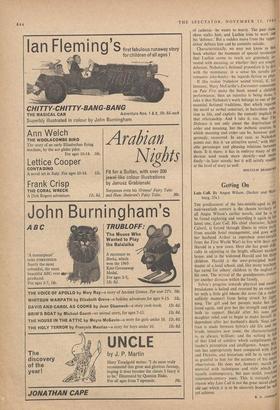Getting On
Late Call. By Angus Wilson. (Secker and War' burg, 25s.)
THE predicament of the late-middle-aged in the mid-twentieth century is the chosen territory ot all Angus Wilson's earlier novels, and he is tP be found exploring and recording it again in his latest one, Late Call. His chief character, SOO Calvert, is forced through illness to retire earl)/ from seaside hotel management, and goes with her husband Arthur (a reprobate semi-invalid from the First World War) to live with their son Harold in a new town. Here she has great diifi" culty in adjusting to the bright, efficient model. house, and to the widowed Harold and his titre children. Harold is the over-principled head" master of a local school, and, like many teachers; has cared for others' children to the neglect 0' his own. The arrival of the grandparents creates yet another division within the family. Sylvia's progress towards physical and mental breakdown is halted and reversed by an encouh' ter with a little girl whom she saves (in a rather unlikely manner) from being struck by light; fling. The girl and her parents make her fne' loved again, and give her the strength and peac,e both to support Harold after his sons at' daughter rebel and to begin to make herself in' dependent after her husband's death. Neat CO trast is made between Sylvia's old life and the brash, tentative new town; the characterisat1o,I1, is, as always, brilliant; and the writing is NI' of that kind of subtlety which compliments thf reader's perception and intelligence. Angus Or son has appropriately been compared with Zolli and Dickens, and historians will be in turn 101 as grateful to him for the accuracy of his socis observation. He does not, however, match hi5 material with techniques and style which 311 equally contemporary, but uses stolid, breaking nineteenth-century ones. This is certainly oht; reason why Late Call is not the great novel aho, old age which it is to be sincerely hoped he WIP yet achieve. a. s. JoiiNS0r4










































 Previous page
Previous page